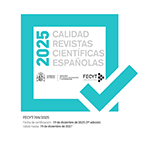Nursing Homes: a feminized sector where men are increasingly in charge
Abstract
The feminization of employment in the residential sector for elderly people offers a starting point for the research that underpins this paper. It is noted that, even though more than eighty percent of those who make up the staff of the residences are women (EPA, 2021Q4), most of the management and organizational positions are taken by men.
After approaching the regional situation, based on secondary data provided by the Junta de Comunidades de Castilla-La Mancha and key informants, we focus on the province of Albacete. The analysis, of the results of the questionnaire applied to the centers, highlight the tendency of male occupation of power and responsibility positions in care homes for elderly people.
Furthermore, this paper reflects on the implications of the ongoing increase of private management in the sector, which has been historically feminized by the social construction of care and currently consolidated by unbalanced power relationships.
Downloads
Article download
License
In order to support the global exchange of knowledge, the journal Sociología del Trabajo is allowing unrestricted access to its content as from its publication in this electronic edition, and as such it is an open-access journal. The originals published in this journal are the property of the Complutense University of Madrid and any reproduction thereof in full or in part must cite the source. All content is distributed under a Creative Commons Attribution 4.0 use and distribution licence (CC BY 4.0). This circumstance must be expressly stated in these terms where necessary. You can view the summary and the complete legal text of the licence.









